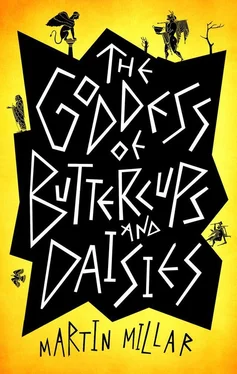And at that moment there was an almighty commotion as the door burst open and Alcibiades arrived. Alcibiades, the most famous, most controversial, loudest, wealthiest, wildest young man in Athens, marched into the dining room with a garland of flowers askew on his head, an entourage of young aristocrats and prostitutes in his wake.
‘Callias, you dog!’ he roared. ‘You think you can have a drinking party without Alcibiades? Hand over a cup of wine and let’s get this party under way!’
Immediately the room degenerated into chaos as the wealthy youth of Athens took over. Suddenly it was full of dancing girls, dancing boys and roaring young drunks, standing on couches, yelling, laughing and singing. Everyone was swept up into the celebration. Only Socrates held back, remaining in his place on his couch, quietly observing. He noticed Luxos on stage, still holding his lyre. Realising that he could no longer be heard, and no one was paying any attention to him, the young poet looked forlorn. Metris took his hand and they watched the drunken revelry for a few minutes before disappearing offstage. Luxos trudged away like a reprimanded schoolboy, his eyes on the ground, his shoulders slumped in misery.
Alcibiades’ face, normally handsome, was flushed red from drinking. ‘Aristophanes!’ he yelled. ‘Are you putting me in your play this year? I’ll be disappointed if you don’t!’
Aristophanes smiled and nodded. He wasn’t putting him in his play. When someone was that keen to be mocked on stage, it wasn’t that much fun doing it.
‘Time for the procession!’ yelled one of Alcibiades’ friends.
‘Everybody outside!’ cried Alcibiades.
Aristophanes did enjoy a good after-party procession. Led by Alcibiades and Callias, everyone grabbed hold of torches, filled up their wine cups, slung their cloaks over their shoulders and headed outside to parade through the dark streets; not an uncommon event after a riotous symposium like the one they’d just attended.
Aristophanes was still in a fine mood. Some drinking, some dancing, a few victories at cottabus — life felt much better. Looking at his problems now, they didn’t seem too bad.
So, my producer is a miser. Eupolis and Leucon have more money to spend. Do they have my talent? Of course not. Once I’ve ironed out a few problems with the choreography I’ll have a play fit to win any Dionysia .
He marched along with a torch in one hand and a cup of wine in the other, bawling out one of his favourite drinking songs.
That Callias, he’s not such a bad soul really. Fat fool, of course, and tardy with the wine, but generous in the end.
When it came to the chorus, Aristophanes noticed that no one was joining in. That was odd. It was a popular song, recounting Athens’ great victory at Salamis. He looked around and realised he was on his own. Somehow, in the darkness, he’d wandered away from the procession. He looked at his cup of wine. It was empty. His torch flickered and went out. He felt a chill breeze blowing through his summer cloak. His good mood vanished with the wind. Now he felt drunk, but not pleasantly so. He realised he’d been fooling himself about his play being nearly ready. It wasn’t. The play was a shambles. Again he had an alarming vision of being booed off stage by angry Athenians. An overwhelming depression settled in. He felt lonely and far from home. He needed rest. He needed sleep.
He didn’t need, or expect, a large man with a bronze breastplate to appear from nowhere, with a sword in his hand.
‘Aristophanes?’
‘Who wants to know?’
‘Me. I’m here to kill you.’
Bremusa withdrew into the shadows as a noisy torchlight procession approached. A great group of revellers, mainly drunken men, with a few women behind them. She realised they must have come from the symposium at Callias’s house and she wondered why Aristophanes wasn’t with them. As the procession passed her, a voice from a house nearby shouted for them to be quiet and stop disturbing the peace. The leader of the procession hurled back some cheerful abuse and started up another raucous song. Bremusa remained hidden till they’d gone, then hurried on.
It was worrying that Aristophanes hadn’t been with his companions. She sensed that something bad was about to happen and picked up her pace. She ran round another dark corner and suddenly came upon Aristophanes and Idomeneus. Idomeneus had a sword in his hand. Aristophanes was fumbling for something at his belt. Perhaps he thought there was a blade there, though there wasn’t. Then he fell over.
So much for Athens’ greatest comic playwright, thought Bremusa . Too drunk to find a weapon or even stay on his feet.
She sprinted forward, unsheathing her sword.
‘Step back, Idomeneus.’
Idomeneus whirled round. When he saw Bremusa approaching he didn’t waste time in speech, he just flew at her with his sword raised. They engaged immediately and there was furious combat on the dark muddy street, the only illumination coming from an oil lamp which burned dimly in front of a small shrine nearby. Their swords clashed noisily and rapidly. Idomeneus of Crete was a very strong man, and a skilful fighter. He’d killed many enemies before the Trojan walls. He’d killed Amazons too. The memory of this infuriated Bremusa, and it was not just her own defeat for which she sought revenge. They fought a desperate battle in the dim light, till it happened that their swords clashed in such a way as to make them both take a step back.
Idomeneus glared at the Amazon. ‘Athena’s not here to help you now.’
‘And Laet’s not here to help you.’
They re-engaged, even more furiously. Bremusa matched him in skill but his strength began to drive her back. His blade slid over hers and she felt a sharp pain as it cut her shoulder. Completely enraged, Bremusa yelled out the battle cry of the Amazons and flung herself forward like one of the Furies, determined to kill him. So violent was her assault that she succeeded in driving him back. She wounded him too, a cut to the left arm that made him wince, though it didn’t slow him.
‘Die, you Amazon bitch,’ yelled Idomeneus, and advanced again, his sword flashing towards her. Bremusa blocked desperately as she was driven back. Idomeneus’s strength was beginning to tell. At that moment they were interrupted by the sound of whistles and pounding feet, very close.
Idomeneus paused, though he maintained his guard.
‘Scythian archers,’ he muttered. There was a second’s indecision, then he took off, disappearing into the darkness. Bremusa whirled round. Aristophanes was sitting on the ground. She dragged him to his feet.
‘Quickly, unless you want to get arrested.’
She dragged him past the shrine and through several small vegetable gardens, escaping the street before the Scythian archers arrived. Aristophanes was too intoxicated to move quickly, but didn’t protest as she shepherded him to safety. When they’d gone far enough to avoid detection, they halted.
‘Where do you live?’
‘I can’t remember,’ mumbled Aristophanes. There was a pause. ‘Take me to Theodota’s.’
‘Theodota? The hetaera? Won’t she have another client at this time?’
To Bremusa’s annoyance, Aristophanes sat down. He was still drunk, and now he looked depressed as well.
‘I don’t want to go home alone,’ he said. ‘Do you live somewhere?’
‘Yes, but you can’t go there. Tell me where you live!’
‘I can’t remember.’
Bremusa could hear voices, not far off. She wasn’t sure if the Scythian archers had given up looking for them or not. They might arrive at any moment. The Amazon didn’t know if arrest would have serious consequences for Aristophanes, but she couldn’t allow herself to be apprehended for causing a disturbance in the street. The Goddess Athena would be annoyed if she were careless enough to get arrested while on a mission for her.
Читать дальше












